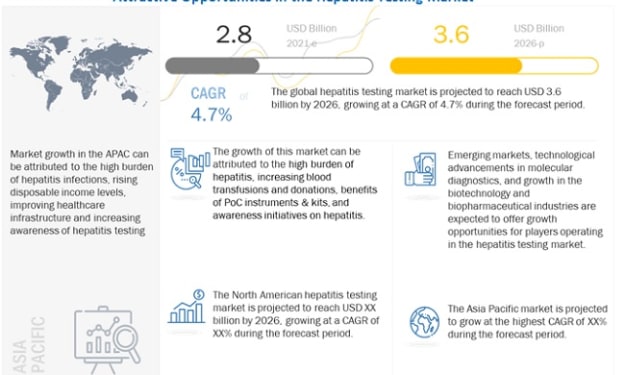Applications and Innovations in the Fertility Test Market
Discover the expanding Fertility Test Market, driven by rising demands, technological advancements, and diverse applications. Explore growth trends, market size, and innovations enhancing reproductive health diagnostics.

The size of global Fertility Test Market in terms of revenue was estimated to be worth $472 million in 2020 and is poised to reach $680 million by 2025, growing at a CAGR of 7.5% from 2020 to 2025.
The global fertility test market is witnessing significant growth, driven by evolving societal trends, advancements in medical technology, and increasing awareness and acceptance of fertility testing. This market encompasses a range of diagnostic tools and services aimed at assessing and monitoring fertility in both men and women, catering to diverse needs and applications.
Key Players:
Swiss Precision Diagnostics (Switzerland), Church & Dwight (US), Prestige Brands Holdings (US), bioZhena (US), Fairhaven Health (US), Fertility Focus (UK), Geratherm Medical (Germany), Hilin Life Products (US), UEBE Medical (Germany), AdvaCare Pharma (US), AVA (Switzerland), Babystart (UK), Valley Electronics (Germany), Sensiia (UK), and Mira Care (US), among others, are some of the major players operating in the global fertility test market.
Download the PDF Brochure at https://www.marketsandmarkets.com/pdfdownloadNew.asp?id=139945432
Current Demands and Needs
The demand for fertility testing is on the rise due to several factors. Firstly, changing lifestyles and delayed parenthood decisions contribute to growing concerns about fertility potential. As more individuals and couples postpone starting families, the need for reliable and accessible fertility tests becomes paramount. Moreover, increasing infertility rates worldwide, attributed to factors such as stress, environmental pollutants, and lifestyle choices, further drive demand for fertility diagnostics.
Additionally, the shift towards proactive healthcare among millennials and older demographics fuels the demand for early fertility assessment. This trend is accompanied by a growing preference for non-invasive and convenient testing methods that can be performed at home or through simple clinic visits.
Growth Drivers
The fertility test market is experiencing robust growth propelled by technological advancements and innovations in diagnostic techniques. Advanced fertility tests now offer greater accuracy, sensitivity, and specificity, enhancing their utility in clinical settings. Furthermore, the integration of digital health technologies, such as smartphone apps and wearable devices, allows for real-time monitoring of fertility parameters, thereby empowering individuals to take control of their reproductive health.
Another significant growth driver is the increasing adoption of assisted reproductive technologies (ART) worldwide. Fertility tests play a crucial role in the ART process by assessing fertility status, guiding treatment decisions, and optimizing outcomes for patients undergoing procedures such as in vitro fertilization (IVF) and intrauterine insemination (IUI).
Moreover, the expanding availability of fertility testing services across various healthcare settings, coupled with supportive government initiatives and investments in reproductive health, contributes to market expansion.
Applications and Insights
The applications of fertility testing span a wide spectrum, addressing various aspects of reproductive health:
• Female Fertility Testing: Includes assessments of ovarian reserve, hormone levels (e.g., AMH, FSH, LH), and menstrual cycle monitoring to evaluate fertility potential and predict ovulation.
• Male Fertility Testing: Focuses on semen analysis to assess sperm count, motility, morphology, and other parameters crucial for male fertility.
• Ovulation Prediction Kits: Offered as home-based tests to detect the surge in luteinizing hormone (LH), indicating the fertile window for women trying to conceive naturally.
• Genetic Testing: Includes preconception carrier screening and genetic testing for inherited disorders that may impact fertility or reproductive outcomes.
• Comprehensive Fertility Assessments: Combine multiple tests and evaluations to provide a holistic view of fertility status, guiding personalized treatment plans.
Direct Purchase at https://www.marketsandmarkets.com/Purchase/purchase_reportNew.asp?id=139945432
In conclusion, the global fertility test market continues to expand, driven by increasing awareness, technological advancements, and the rising prevalence of infertility. With a growing emphasis on personalized healthcare and proactive fertility management, the market is poised for further innovation and adoption of advanced diagnostic solutions. As fertility testing evolves, it promises to play a crucial role in empowering individuals and couples to make informed decisions about their reproductive health journey.
About the Creator
Enjoyed the story? Support the Creator.
Subscribe for free to receive all their stories in your feed. You could also pledge your support or give them a one-off tip, letting them know you appreciate their work.





Comments
There are no comments for this story
Be the first to respond and start the conversation.